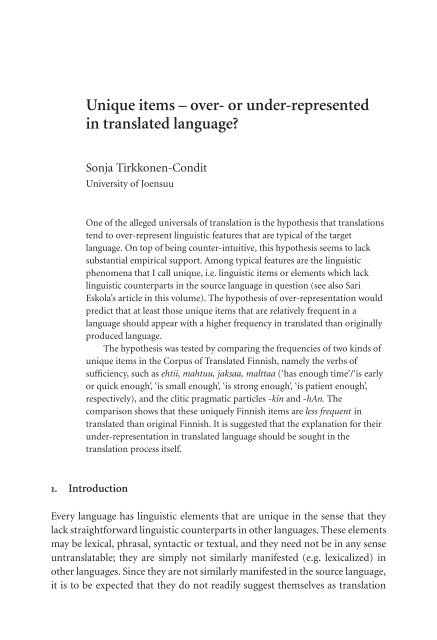Translation Universals.pdf - ymerleksi - home
Translation Universals.pdf - ymerleksi - home
Translation Universals.pdf - ymerleksi - home
Create successful ePaper yourself
Turn your PDF publications into a flip-book with our unique Google optimized e-Paper software.
Unique items – over- or under-represented<br />
in translated language?<br />
Sonja Tirkkonen-Condit<br />
University of Joensuu<br />
One of the alleged universals of translation is the hypothesis that translations<br />
tend to over-represent linguistic features that are typical of the target<br />
language. On top of being counter-intuitive, this hypothesis seems to lack<br />
substantial empirical support. Among typical features are the linguistic<br />
phenomena that I call unique, i.e. linguistic items or elements which lack<br />
linguistic counterparts in the source language in question (see also Sari<br />
Eskola’s article in this volume). The hypothesis of over-representation would<br />
predict that at least those unique items that are relatively frequent in a<br />
language should appear with a higher frequency in translated than originally<br />
produced language.<br />
The hypothesis was tested by comparing the frequencies of two kinds of<br />
unique items in the Corpus of Translated Finnish, namely the verbs of<br />
sufficiency, such as ehtii, mahtuu, jaksaa, malttaa (‘has enough time’/‘is early<br />
or quick enough’, ‘is small enough’, ‘is strong enough’, ‘is patient enough’,<br />
respectively), and the clitic pragmatic particles -kin and -hAn. The<br />
comparison shows that these uniquely Finnish items are less frequent in<br />
translated than original Finnish. It is suggested that the explanation for their<br />
under-representation in translated language should be sought in the<br />
translation process itself.<br />
1. Introduction<br />
Every language has linguistic elements that are unique in the sense that they<br />
lack straightforward linguistic counterparts in other languages. These elements<br />
may be lexical, phrasal, syntactic or textual, and they need not be in any sense<br />
untranslatable; they are simply not similarly manifested (e.g. lexicalized) in<br />
other languages. Since they are not similarly manifested in the source language,<br />
it is to be expected that they do not readily suggest themselves as translation
















